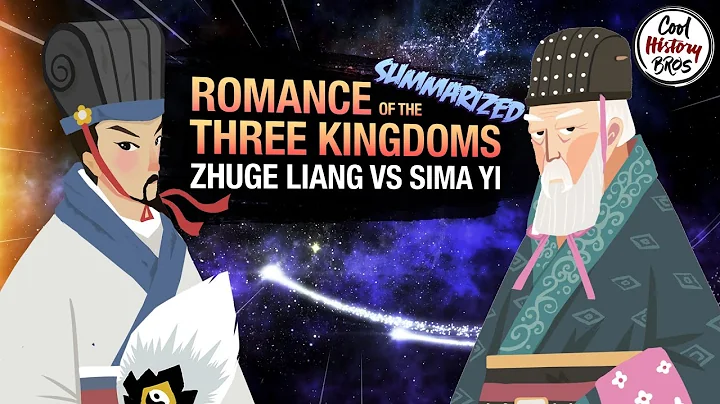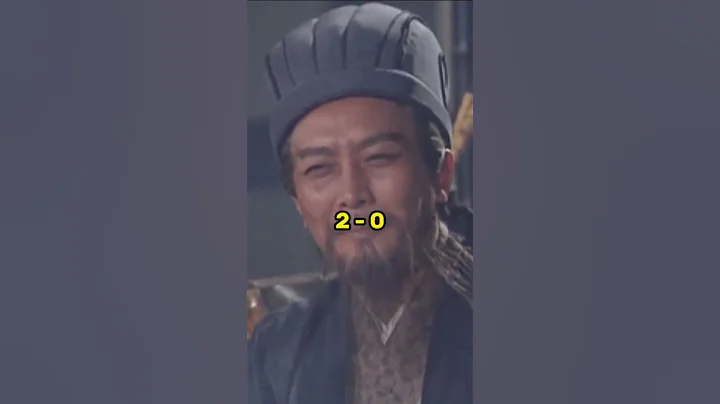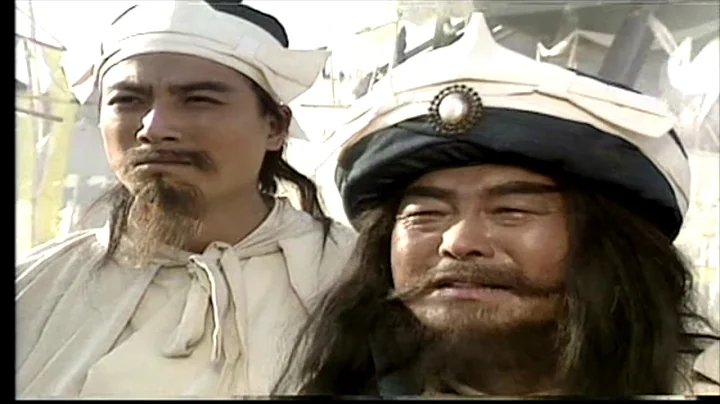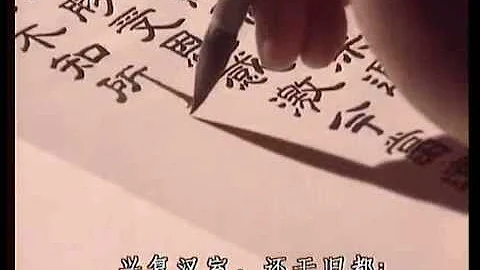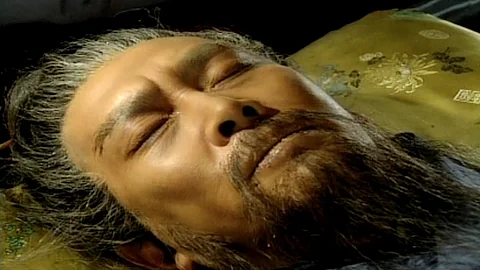Zhuge Liang spent the rest of his life trying his best to carry out the Northern Expedition. From 227 AD to 234 AD, he went out to Qishan Mountain six times in eight years. The last time he died of illness in the military camp, composing a tragic song of unrealized ambitions.
For thousands of years, while people have expressed endless sighs and regrets for Zhuge Liang, they have also reflected on: Is it right for Zhuge Liang to leave Qishan six times? If so, why can't it be successful? If it is wrong, why does it win such respect and regret from future generations?
Thousands of meritorious deeds will be left for future generations to comment on. Today I will also comment on the merits and demerits of Zhuge Liang's six expeditions to Qishan.

Why did Zhuge Liang want to go to the Northern Expedition?
First of all, Zhuge Liang's Northern Expedition was inevitable and was determined by his personality and ambition. He and Liu Bei have the foolishness to know and meet. As a scholar, his highest political goal is of course to make achievements and govern the country and bring peace to the world; his highest moral principle is to be grateful and repay, to uphold his faith, and to die for his bosom friends. Both of these aspects are related to Liu Bei.
Liu Bei is a heroic figure with great ambitions and has the reputation of being a descendant of the royal family. Liu Bei treats him with such courtesy and trust. As an intellectual, what better situation could there be? So when Liu Bei was alive, he did his best for Liu Bei and helped Liu Bei establish his empire; after Liu Bei died, he left him alone. Under such circumstances, could he not "dedicate himself to death"?

Secondly, Zhuge Liang’s Northern Expedition was also forced by the situation. Among the three kingdoms of Wei, Shu, and Wu, in terms of geography and strength, Wei occupies a vast area in northern China, has abundant human and material resources, and is the strongest. Wu occupies the entire south of the Yangtze River, and is second only to Wei in strength, and has the Yangtze River's natural moat as a barrier. Although Shu is a land of abundance, it is located in a corner, with a small population and the weakest national power. This can also be seen from the documents listed when Shu and Wu were destroyed: the number of Shu Kingdom was 280,000 households and 940,000 people; and Wu Kingdom was more than 520,000 households and 2.3 million people. The Kingdom of Wu is much larger than the Kingdom of Shu.
Because of this, sooner or later, Shu will also be in the mouths of Wei and Wu. Rather than sit back and wait for death, it is better to attack instead of defend. Zhuge Liang adopted this policy. He said in "The Later Master's Biao":
"The late emperor was concerned about the conflict between the Han and the traitors, and the royal family was not in peace, so he entrusted his ministers to fight against the thieves. With the wisdom of the late emperor, he measured the talents of his ministers, so he knew that his ministers would attack the thieves and weaken the enemy. It's strong. If you don't attack the thieves, the king's career will also be destroyed. Who can attack them? That's why it's not in line with Zhuge Liang's character to take the initiative to attack. ambition. "It's not just the timing of heaven, it's also the plan of man." This is his world view. Moreover, during the attack, you may be able to find some opportunity to defeat the enemy and fundamentally reverse the situation. There are many examples in history of crisis first and safety later.
So, why did Zhuge Liang insist on sending troops out of Qishan instead of choosing another attack path?
This issue is also determined by the combination of the situation and the personal personality of the decision-maker. According to Zhuge Liang's idea, the original plan was to attack in two groups, one from Hanzhong to Qinchuan, occupying Chang'an to Wan and Luo, the other from Jingzhou to Xiangyang and heading north. , directly attack Xuchang , this is indeed a very clever strategy. However, due to the betrayal of Sun Wu , Guan Yu lost Jingzhou. If Jingzhou loses, it is equivalent to losing a fist. Of course now there is only one way out of Hanzhong.
Of course, even when leaving Hanzhong, there are two routes: One is the one proposed by Wei Yan at the beginning of the army, which is to use five thousand elite troops to leave Baozhong, follow the east of Qinling , and when Ziwu Valley North, surprise attack on Chang'an. But this plan was not adopted by Zhuge Liang. Zhuge Liang thought this plan was too risky.
In fact, although Wei Yan's plan is a bit risky, it is still a good strategy. Even Sima Yi criticized Zhuge Liang for being too cautious and losing his chance to fight.When Sima Yi was appointed to lead the troops to fight Zhuge Liang, he said to the vanguard Zhang Tai: "Zhuge Liang has been cautious in his life and has never dared to make mistakes. If I had sent troops to capture Chang'an from Ziwu Valley first, it would have been much earlier. He was not without a plan. , but for fear of loss, he is unwilling to take risks." Sima Yi actually coincided with what Wei Yan had said earlier. It can be seen that Zhuge Liang's insistence on "taking the flat road from Longyou and advancing troops in accordance with the law" was determined by his military personality.
When Zhuge Liang answered the generals who asked him why he only attacked Qishan Mountain, he said: "Qishan Mountain is the head of Chang'an: Longxi counties, if soldiers come from wandering around, they must pass through this place; it is also adjacent to Weibin in the front and sloping valley in the back. , go out from the left and enter from the right, you can ambush troops, it is a place to use force. Therefore, I want to take this place first to gain advantage of the location. "
Zhuge Liang's choice is not a mistake, but it is not necessarily the best plan. This is obvious.
However, it is also obvious that Zhuge Liang's Northern Expedition was destined to fail (actually it was a failure, unsuccessful is just a euphemism). This is also caused by many factors.
First of all, he encountered the insurmountable obstacle of Sima Yi.
Before Zhuge Liang went out for the first time, he said many times that he had long wanted to attack Wei, but he was just worried about Sima Yi. Later Ma Su offered him a counter-intuitive plan to ask Wei Jun Cao Rui to remove Sima Yi from his military power. As soon as Zhuge Liang received this information, he sent troops. As Zhuge Liang himself said: "Sima Yi is the only patient he has suffered in his life."
However, Cao Rui is also a smart man after all. Whenever things are urgent, he always recruits Sima Yi in time, thus breaking Zhuge Liang's plan. When they first came out of Qishan, the two sides competed for street pavilion . The heroes originally had the same idea, but due to Zhuge Liang's wrong use of Ma Su, they ultimately ended in failure. The next few times, everyone has his own victory or defeat. Although the Shu troops were mostly victorious, Sima Yi adopted a defensive strategy as soon as he faced a disadvantage. Sima Yi held on, but Zhuge Liang could not attack, so he had to retreat.
In the end, Zhuge Liang died of illness in Wuzhangyuan . From another perspective, it might not be Sima Yi's victory.
Secondly, even if Sima Yi was really burned to death in Hulu Valley, Zhuge Liang may not be able to capture Chang'an.
When he left Qishan, because Wei Guo Hao Zhao was guarding Chencang City, Zhuge Liang attacked for more than 20 days but failed to capture it. Finally, he withdrew because he ran out of food. It can be seen that there is no shortage of talents in Wei, with Sima Shi, Sima Zhao, Deng Ai, Zhong Hui, etc. emerging in endlessly, while the talents in Shu are scattered. In the end, only Jiang Wei was the sole support. The so-called "there are no generals in Sichuan, Liao Hua is the pioneer" has become an excuse to make future generations laugh.
Third, the problems of insufficient troops and food have always plagued Zhuge Liang’s Northern Expedition.
Sima Yi had long expected that the Shu troops were in a hurry and if they held on, they would be out of food and retreat. The second they left Qishan, they returned without success because the Wei soldiers held fast and the Shu soldiers were short of food. When he left Qishan on the 5th, Zhuge Liang led his troops to Longsi and pretended to be ghosts to cut wheat. Li Yan Due to the shortage of military rations, he made lies to get Zhuge Liang to withdraw his troops, which somewhat reflected some problems.
From the perspective of military strength, Wei is a great country. Sending more than 100,000 or 200,000 troops is not a problem. Shu is a small country and cannot shoulder an excessive military burden. When Zhuge Liang first came out of Qishan, he said he had 300,000 troops. If the total population of Shu was less than one million, wouldn't it mean that one of the three people was serving as a soldier? It is impossible for a war to be fought without death. How can Shu soldiers withstand the exhaustion of successive years of war? Therefore, when he left Qishan on the fifth day of the war, Zhuge Liang had to let the soldiers who should take turns stay to fight.
Fourth, the Shu Kingdom is internally weak.
The queen leader Liu Chan was fatuous, reused eunuchs, and was greedy for pleasure. When they were out of Qishan, Sima Yi used the same countermeasures to drive a wedge between Liu Chan and Zhuge Liang; when the Shu soldiers were winning steadily, Liu Chan actually issued an edict to recall Zhuge Liang. As a result, this Northern Expedition was abandoned halfway.In the later stage, Zhuge Liang had to do everything by himself, and he himself felt more and more overworked, so much so that he vomited blood and died.
Fifth, the Shu soldiers fought alone.
Soochow Ever since the Battle of Chibi , there has always been a gap between Soochow and Shu. Guan Yu and Liu Bei directly destroyed the Wu-Shu alliance. After Liu Bei's death, although Zhuge Liang restored the alliance, Soochow was not sincere. Zhuge Liang left Qishan for the sixth time, but Soochow mostly took a wait-and-see attitude. Only on the sixth time did he send troops to attack Wei, but he suffered a disastrous defeat immediately. When Zhuge Liang heard the news, he couldn't help but sigh and fainted to the ground. He knew there was nothing he could do.
Based on the above situation, it is not difficult to see that Zhuge Liang’s Northern Expedition will definitely be difficult to succeed. Even if there is some kind of opportunity (such as Sima Yi being burned to death in Hulu Valley, or Wei Yan's plan being adopted). By luck, we succeeded and captured Chang'an. Will we be able to destroy Wei and annex Wu? That is certainly impossible.
If this is the case, then why is it that for thousands of generations, it is only Zhuge Liang that people have admired, worshiped and praised?
This aspect depends on the Chinese people's ambition and view of history: heroes should not be judged by success or failure. The people's view of history is opposed to the view of history that "winners are kings and losers are bandits." "The Romance of the Three Kingdoms" undoubtedly reflects the Chinese people's view of history.
On the other hand, it lies in the cause that Zhuge Liang insisted on, that is, the banner set by Zhuge Liang in his Northern Expedition: Restoring the Central Plains and reviving the Han Dynasty. The flag is obviously symbolic. In fact, people in the Three Kingdoms era already knew that the decline of the Han Dynasty was inevitable. Lu Su first met Sun Quan and analyzed the situation for Sun Quan, and said, "The Han Dynasty cannot be revived, Cao Cao cannot be eliminated." Zhuge Liang's Longzhong decision was based on the tripartite rule. Do Zhuge Liang and Liu Bei really want to get rid of Cao Cao and still support Han Xian Emperor as emperor? I'm afraid that's not the case. Therefore, "reviving the Han Dynasty" is just a banner used by Liu Bei to win people's hearts.
At the same time, "reviving the Han Dynasty" was also the embodiment of the patriotic spirit of the Han nation in the Song and Yuan Dynasties. The Song and Yuan Dynasties was the period when the story of the Three Kingdoms was widely circulated and the "Romance of the Three Kingdoms" was written. Therefore, the desire of the Han nation to resist foreign invasion during the Song and Yuan Dynasties was reflected in the novel. Lu You Didn't you sing loudly that "the country prospered the Han Dynasty, and the heaven's heart beat Cao Cao"?
The third reason is Zhuge Liang’s brilliant personality. In order to restore the Central Plains and revive the Han Dynasty, Zhuge Liang did his best and died. This spirit is reflected in a just cause and a great personality who does not hesitate to sacrifice himself for the sake of the country and the nation. Zhuge Liang accomplished everything he could with his personal subjective efforts during his six journeys out of the Qi Mountains. He displayed great ingenuity: he made war a colorful art and created dazzling examples of glorious battles. This is a success in itself. Especially his tragic death is enough to make future generations burst into tears.
Du Fu has a poem that goes: Three visits frequently make plans for the world, and two dynasties open up the hearts of veterans. He died before leaving the army, which made the hero burst into tears.
Du Fu sang out the common mood of future generations all over the world in remembering Zhuge Liang.


